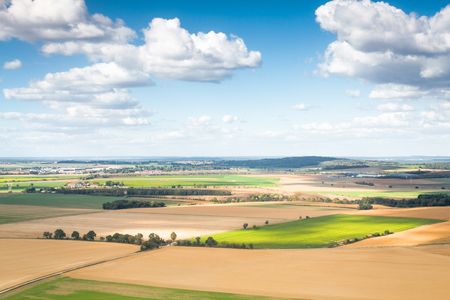Understanding Perishables and Food Safety in the UK Outdoors
When camping in the British countryside, ensuring the safety of your food is paramount. Perishables, such as fresh meats, dairy products, eggs, and certain fruits and vegetables, are highly susceptible to spoiling if not stored correctly. In the UK’s often unpredictable climate—characterised by dampness, cool nights, and occasional warm spells—the risk of foodborne illnesses increases if perishables are mishandled. Unlike in some countries with consistently high temperatures, the British weather can lull campers into a false sense of security; even on cooler days, bacteria can multiply rapidly. Additionally, unique considerations arise from local wildlife, including foxes and badgers, which may be attracted to improperly stored food. Awareness of these factors is crucial for maintaining both personal health and harmony with nature while enjoying your outdoor adventure.
2. Choosing the Right Storage Solutions for British Campsites
When camping in the British countryside, selecting appropriate storage for perishables is crucial due to the UK’s unpredictable weather, damp conditions, and varied terrain. The right choice can mean the difference between fresh ingredients for your fry-up and a soggy mess. Here’s a breakdown of common solutions:
Overview of Storage Options
| Storage Solution | Best For | Pros | Cons |
|---|---|---|---|
| Cool Boxes (Passive & Electric) | Long weekends, group camping | Keeps food chilled for up to 48 hours; robust against rain and mud; electric options plug into car/campsite power | Bulky; can be heavy; electric models need access to power |
| Insulated Bags | Short trips, day hikes, solo campers | Lightweight; easy to carry; packs flat when empty; decent short-term cooling with ice packs | Limited insulation duration (4-8 hours); less effective in prolonged heat or humidity |
| Eco-Friendly Containers (Bamboo, Stainless Steel) | Sustainable camping, transporting dry goods or snacks | No plastic waste; durable; odour-resistant; easy to clean even at basic campsites | Do not provide cooling; best paired with other chilled storage options |
Suitability for British Weather and Terrain
The British climate often swings from drizzle to bright sunshine within hours. Hard-sided cool boxes are especially useful on uneven ground and during wet spells, as they prevent water ingress and keep wildlife out—handy if you’re sharing your pitch with curious foxes or badgers. Insulated bags excel for mobility but may struggle during muggy July afternoons without frequent ice pack swaps.
Packing Tips for Maximum Freshness
- Layer perishables: Place meats and dairy at the bottom of cool boxes with ice packs, and keep fruit/veg on top.
- Avoid overpacking: Air circulation helps maintain temperature—don’t cram containers full.
- Double-bag items: Prevent leaks by using watertight eco-containers inside coolers, especially on muddy pitches.
- Keep shade in mind: Always position storage in natural shade where possible—hedgerows or tent awnings work well.
A Note on Local Wildlife and Security
Campsites across Britain are home to opportunistic animals. Secure latches on cool boxes deter unwelcome guests. For extra peace of mind, opt for containers with reinforced lids or bring a bungee cord to tie down lids overnight.

3. Using Nature to Your Advantage: Keeping Food Cool without a Fridge
When camping in the British countryside, you won’t always have access to a fridge or even a reliable cooler. Luckily, the UK’s landscape offers plenty of natural features that can help keep your perishables fresh. Here are some practical ways to make use of your surroundings:
Seek Out Natural Shade
The simplest trick is to use shade. In woodlands, set up your camp kitchen under dense tree cover or beside hedgerows. The dappled light under an oak or beech canopy will keep temperatures lower than out in the open. Even on cooler days, direct sunlight can quickly spoil milk, cheese, and meats.
Use Streams and Brooks
If you’re near a stream or brook—plentiful in many parts of the UK, from Dartmoor to the Lake District—you’ve got a makeshift chiller at hand. Place sealed containers or watertight bags containing perishables in the water, anchoring them with stones. The moving water keeps things much cooler than the ambient air, especially early in the morning and after sundown.
Safety Note
Always ensure food is tightly sealed to prevent contamination and avoid placing anything upstream from livestock or obvious sources of pollution.
Digging Earth Larders
If water isn’t available, consider digging a shallow hole—a traditional “earth larder.” Soil just below the surface is noticeably cooler than above ground. Line the hole with leaves or grass (avoid anything prickly or toxic), place your food inside a bag or container, then cover it over with more foliage and soil for insulation.
Leverage Stone Walls and Outcrops
Stone features common in rural Britain—like drystone walls and rocky outcrops—retain coolness throughout the day. Store perishables against their shady side, particularly during the hottest hours. Just be mindful of local wildlife who might also enjoy your picnic!
A Final Word on Wildlife
No matter which method you choose, always store food in animal-proof containers. Foxes, badgers, and even inquisitive squirrels have been known to raid campsites across Britain. Keeping perishables cool is vital, but so is keeping them secure.
4. Essential Tips for Packing and Organising Your Food
When venturing into the British countryside, thoughtful planning and organisation of your food are paramount to keeping perishables fresh and safe. Here’s a practical guide with tried-and-tested tips for pre-prepping, portioning, and layering foods, as well as essential advice for avoiding cross-contamination during your camping adventure.
Pre-Prepping for Success
Before setting off, prep as much food as possible at home. Chop vegetables, marinate meats, and pre-cook items that can be easily reheated over a camp stove. Not only does this save time at camp, but it also reduces waste and minimises the need to handle raw ingredients in the wild—where water and sanitisation options may be limited.
Portioning: Less Waste, More Freshness
Dividing meals into single-use portions is a classic trick for campers. Use reusable containers or sealable bags to separate ingredients by meal or day. This method not only helps you pack exactly what you need (reducing weight) but also avoids repeatedly exposing all your food to outside air whenever you open your cool bag or box.
| Food Type | Recommended Portioning Method |
|---|---|
| Meats | Individually wrap or use small containers; keep chilled |
| Dairy (e.g., cheese) | Slice/cube at home; store in airtight tubs |
| Vegetables | Pre-chop and store in sealable bags |
Layering Your Cool Bag or Box
The way you pack your cooler makes a big difference. Place the most perishable items (like raw meat or fish) at the bottom, furthest from the lid, where it’s coldest. Ready-to-eat items should go on top for easy access and reduced risk of contamination. Use ice packs or frozen water bottles between layers to keep everything chilled evenly.
Packing Order Example:
- Ice packs/frozen bottles on the bottom
- Raw meats (well-sealed)
- Dairy products
- Prepared veg and fruits
- Bread and snacks on top
Avoiding Cross-Contamination: Safety First
Always keep raw and cooked foods separate—not just in storage, but also when preparing meals at camp. Bring colour-coded chopping boards if possible, or thoroughly wash surfaces between uses. Hands should be cleaned after handling raw ingredients; biodegradable wipes are handy if running water is scarce. Never reuse packaging that has held raw meat for other foods.
By taking these steps to organise your perishables efficiently, you’ll enjoy fresher food throughout your trip—and peace of mind about food safety in the great British outdoors.
5. Protecting Your Supplies from British Wildlife and Insects
When camping in the British countryside, it’s not just the weather you need to be mindful of—local wildlife such as foxes, badgers, and a variety of insects can be surprisingly adept at sniffing out your perishables. Here are some practical measures to ensure your food remains untouched by curious creatures and persistent pests.
Understanding Local Wildlife Behaviour
Foxes and badgers are common visitors to UK campsites, especially after dark. These animals have an excellent sense of smell and will readily investigate unattended food. Always store perishables in airtight containers or cool boxes with secure lids. If possible, elevate your supplies off the ground using picnic tables or dedicated racks provided at some campsites. Avoid leaving any scraps or packaging behind, as even small traces can attract unwanted attention.
Best Practices for Food Storage
Keep all food inside your tent’s porch area or, preferably, locked away in your car overnight. Never store perishables inside the main sleeping area of your tent; this helps deter wildlife and keeps your sleeping space clean. Use reusable silicone bags or sturdy plastic tubs for storing cheese, cooked meats, and dairy products—the less scent escapes, the less enticing it is to wildlife.
Dealing with Insects
Insects like wasps, ants, and midges can quickly become a nuisance around open food. Cover dishes immediately after serving, and consider using mesh food covers if you’re eating outdoors. For added protection, keep a small supply of citronella candles or natural insect repellents on hand. Clean up spillages straight away and dispose of rubbish in sealed bags or bins provided by the campsite.
Final Thoughts on Responsible Camping
Respecting local wildlife doesn’t just mean protecting your own supplies—it’s also about ensuring animals don’t develop habits of scavenging from campers. By following these steps, you’ll safeguard your perishables and contribute to the preservation of Britain’s natural beauty for everyone to enjoy.
6. Eco-Friendly Waste and Leftover Management in the Great British Outdoors
Best Practices for Minimising Waste
When camping in the British countryside, one of the most responsible things you can do is to reduce the amount of waste you generate. Plan your meals ahead and bring only what you need, opting for minimal packaging or reusable containers. Choose locally sourced produce when possible to cut down on food miles and unnecessary wrapping. Where practical, repurpose packaging as makeshift storage for leftovers or wet items. Always separate recyclables from general waste and take both home if no suitable bins are available at your campsite.
Storing Leftovers Safely
The unpredictable British weather can make keeping leftovers fresh a challenge, but with a bit of forethought, it’s manageable. Invest in airtight, reusable containers that seal in freshness and keep wildlife at bay. After each meal, cool leftovers quickly and store them in a shaded spot or a well-insulated cool bag with ice packs. Label containers with the date so you know what needs eating first. If you’re without refrigeration, try to finish perishables within 24 hours and avoid keeping dairy or meat products any longer than necessary.
Leave No Trace on the Countryside
The UK’s beautiful landscapes are for everyone to enjoy, so it’s vital we leave them as we found them—or better. Adhere strictly to the Countryside Code: “Take only pictures, leave only footprints.” Clear away all rubbish, including food scraps which can harm local wildlife and disrupt ecosystems. Compost organic waste at home rather than leaving it behind. If you use biodegradable cleaning products, ensure they’re used well away from water sources. Lastly, double-check your pitch before departing: pick up every bit of litter, dismantle makeshift fire pits, and restore disturbed ground where possible.
Final Thoughts
Sensible storage and mindful waste management not only keep your provisions safe but also help protect Britain’s wild places for future generations. By planning ahead and practising these eco-friendly habits, you’ll contribute positively to the great outdoors while enjoying your camping adventure to the fullest.


